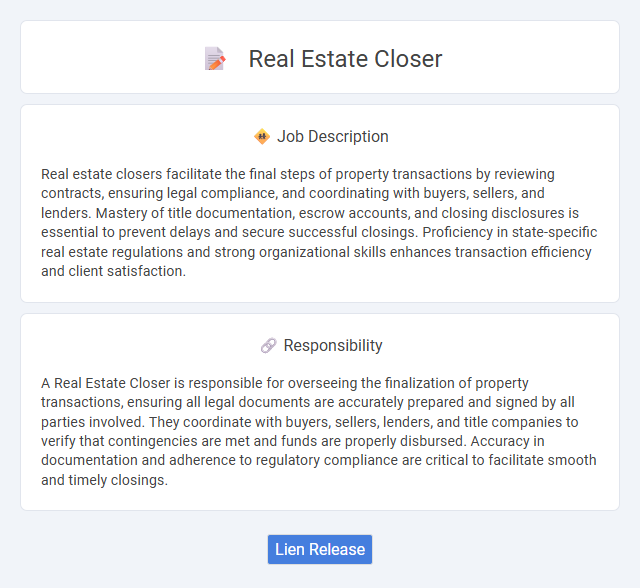
Real estate closers facilitate the final steps of property transactions by reviewing contracts, ensuring legal compliance, and coordinating with buyers, sellers, and lenders. Mastery of title documentation, escrow accounts, and closing disclosures is essential to prevent delays and secure successful closings. Proficiency in state-specific real estate regulations and strong organizational skills enhances transaction efficiency and client satisfaction.
Individuals with strong attention to detail and excellent organizational skills are likely to excel in a real estate closer role, as the job requires managing complex paperwork and ensuring accuracy in transactions. People who remain calm under pressure and possess effective communication abilities may be well-suited, given the need to coordinate between multiple parties and resolve potential issues. Those who struggle with multitasking or handling tight deadlines might find the job challenging and less suitable to their strengths.
Qualification
Real estate closers must possess a strong understanding of contract law and property regulations to ensure accurate and compliant transaction finalization. Proficiency in managing escrow accounts, title searches, and settlement statements is essential for successful closing coordination. Effective communication skills and attention to detail are critical qualifications to handle negotiations and resolve potential closing issues efficiently.
Responsibility
A Real Estate Closer is responsible for overseeing the finalization of property transactions, ensuring all legal documents are accurately prepared and signed by all parties involved. They coordinate with buyers, sellers, lenders, and title companies to verify that contingencies are met and funds are properly disbursed. Accuracy in documentation and adherence to regulatory compliance are critical to facilitate smooth and timely closings.
Benefit
Real estate closers likely provide significant benefits by ensuring smooth transaction processes, minimizing errors, and reducing the risk of legal complications. Efficient closers may save time and increase client satisfaction, which can lead to repeat business and referrals. Their expertise probably contributes to faster closing times, enhancing overall productivity in real estate deals.
Challenge
Real Estate Closers often face the challenge of coordinating multiple stakeholders to ensure a smooth transaction, which requires meticulous attention to detail and strong organizational skills. The probability of encountering last-minute issues, such as financing delays or document discrepancies, calls for quick problem-solving and effective communication. Successfully navigating these obstacles is crucial for timely closings and client satisfaction.
Career Advancement
Real estate closers play a critical role in finalizing property transactions by coordinating between buyers, sellers, lenders, and attorneys to ensure smooth and accurate closings. Advancement opportunities include moving into senior closer positions, title officer roles, or transitioning into real estate sales, transaction coordination, or management within brokerage firms. Mastery of local real estate laws, exceptional negotiation skills, and proficiency in closing software significantly enhance career growth prospects in this field.
Key Terms
Lien Release
A Real Estate Closer is responsible for ensuring all lien releases are accurately processed to clear the title before closing, protecting buyers and lenders from potential claims. They coordinate with title companies, lenders, and contractors to obtain and verify lien releases, which are critical for finalizing property ownership transfer. Precise management of lien releases prevents post-closing disputes and facilitates a smooth real estate transaction closure.
 kuljobs.com
kuljobs.com